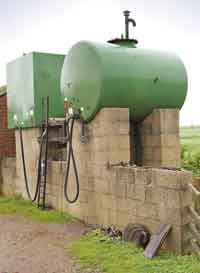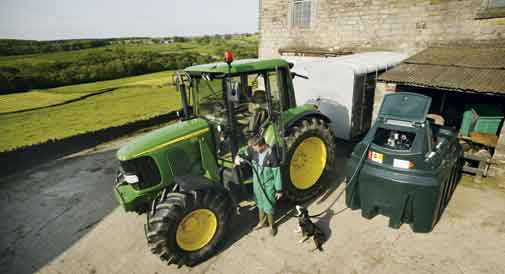Fuel changes: Your questions answered

The diesel that you put in your tractors, combines and telehandlers is changing on 1 January 2011. So it could be time to turn your attention to that elderly fuel store, as Duncan Lambert from Rix Petroleum explained to David Cousins
Q: Fuel change? What fuel change?
A: The specification of red diesel, which currently contains 1000ppm of sulphur, is going to change and this will alter some of the characteristics of the fuel. It will be replaced by 10ppm sulphur gas oil, known as sulphur-free. The change has been timed to coincide with the introduction of the new Tier 3b engines that meet tougher emissions regulations.
Q: Will the lack of sulphur cause engine problems?
A: Though the reduction in sulphur does mean it has less ability to provide lubrication, fuel manufacturers put in additives to compensate. Cars and trucks have been running on it for years.
Q: So what’s different about the new fuel?
A: It’s now the same fuel as white diesel except that it has a red dye added. As well as the reduced sulphur content, it may also have up to 7% biodiesel (sometimes referred to as FAME – Fatty Acid Methyl ester) added, whereas in the past red diesel had none.
Q: What difference does that make?
Biodiesel may be more environmentally friendly than mineral diesel, but it has some drawbacks:
• It breaks down faster than mineral diesel so you shouldn’t leave it sitting in the fuel store for as long.
• It pulls in moisture from the air (hygroscopic), which encourages small quantities of water to build up in the fuel store.
• It provides a source of nutrition for the bacteria that already exist in the fuel and encourages them to multiply, which in turn blocks fuel filters.
Q: So it would be a good idea to fit a filter to my fuel tank?
Yes. If you have any bug growth, the right type of filter will stop most of it passing through to the vehicle tank where it will be more difficult to deal with. There may be other impurities already in the tank as well – over time, dirt will accumulate in the tank and generally settles on the bottom. Water will build up too, unless drained off.
Q: Surely there have always been impurities in diesel?
A: There have, and until relatively recently tractor engines coped reasonably happily with quite high levels. However, the latest generation of high-pressure, common-rail tractor engines won’t tolerate dirty diesel so the tractor makers now fit very fine filters that are more likely to clog up if your fuel isn’t clean.
Q: Where do the impurities come from?
A: Primarily from the accumulated muck and water in older farm fuel stores, many of which date back to the 1950s and 1960s.
Q: How do I know if I have a problem?
A: First off, you need to do a water test, which costs about £12 (see suppliers box) and shows you how much water there is in your fuel store. If you haven’t got a filter on the diesel store (or haven’t replaced the element since Mick Jagger was a young man) you can buy one for about £50 with a replaceable £8 element. It fits between the tap and the start of the hose so you don’t need to drain down the tank.
Q: My tank is really old. Should I replace it?
A: It depends what state it’s in. It may be fine. But if you lift the lid and find lots of rust from condensation underneath, it’s likely that rust particles have gone into the fuel.
Equally, if there’s strong doubt as to whether it’s up to the job generally, you may want to splash out on a new one.
Q: Ouch, what will that cost?
A: Roughly speaking, £1400 for a 2500-litre plastic fuel station with pump or £2500 for a 5000-litre version.
Q: What are the actual rules and regs relating to farm fuel tanks?
A: Farms have traditionally enjoyed a less strict interpretation of the 1991 sewage and effluent regulations than most other industries. That 40-year-old tank is still perfectly legal provided it doesn’t leak. However, the moment you change or modify it, you come under newer rules that require a bund with an additional 10% storage capacity.
Also bear in mind that if you did have a big leak, the Environment Agency would hold you responsible for the clean-up costs. Your insurer might not pay out, either.
Q: If I buy a new tank, will the problem go away?
A: It should do, but make sure that you buy the right tank and install it properly. You will still need to keep an eye on things. Test for water once a month and carefully remove any accumulation via the drain tap. Make sure your new tank has a filter and water drain plug; they’re sometimes options.
Q: What difference will the biodiesel content make?
A: The biodiesel fraction will degrade over time, though the exact timescale is hard to pin down. Six months to a year seems the general feeling, but the main thing is to turn your fuel stock over as quickly as possible.
Q: Will the new fuel cost more than the old one?
A. A 1-2p/litre premium over the existing red diesel seems likely.
Q: Will I have to use this new sulphur-free gas oil in my grain drier too?
A: No, you should have other options. The 1000ppm sulphur diesel that you use now may still be available after 1 January 2011, but it can only be used legally in driers or static engines, ie, non-mobile machinery.
There’s also something called Class D Gas Oil or Furnace Flame that is 2p/litre less than sulphur-free gas oil but it can only be used in grain driers as it won’t work in any engine.


